USA Ambassador Kohorst Clarifies 2020 Croatian Visa Waiver (VIDEO INTERVIEW)
According to Croatian Foreign and European Affairs Minister Gordan Grlić Radman, the United States (USA) planned to waive visas for Croatian citizens by the end of 2020 when the two countries sign a Double Taxation Treaty. While US Ambassador Robert Kohorst backed the 2020 timeline in yesterday's interview, he also emphasized that Croatia has not yet met all the conditions. And an inside source has confirmed that a Double Taxation Treaty is still 3 to 4 years away.
USA Visa Waiver Contingent on Refusal Rate Reduction: UPDATE
In an interview with Paul Bradbury of Total Croatia News yesterday, February 19, 2020; US Ambassador Robert Kohorst commented on Grlić Radman's claim that Croatia has fulfilled the conditions for the visa waiver program.
"We expect that there is a very good chance that Croatia will qualify for the Visa Waiver Program in 2020, but there are some things that need to be completed yet. Both, you get the refusal rate below 3%, which is calculated on September 30. So, it's starting to look like they'll achieve that goal, but it's still subject to what happens in terms of people applying for visas," he explained.
"The second one is that there is about four or five documents that need to be with the Department of Homeland Security. Those enrollment processes: Croatia is working hard on them. We expect them to be completed but they are not done yet. So, he (Croatian Foreign and European Affairs Minister Gordan Grlić Radman) wasn't wrong in terms of expecting to get it done, but there is still some work to be done," he concluded.
USA Croatia Double Taxation Treaty Not Expected in 2020: UPDATE
According to an inside source, the USA Croatia Double Taxation Treaty will not be signed in 2020 and is likely 3 to 4 years away under the best circumstances. A Double Taxation Treaty portfolio has not yet been created by the US Treasury Department. After the portfolio has been created, it is a 2 year process to prepare the DTT Treaty for signature by both countries. Then it is sent to the US Senate for approval.
There are currently 30 countries ahead of Croatia on the USA DTT priority list.
Croatia Foreign Minister Claimed Visa Waivers, Double Taxation Treaty for 2020
"We have fulfilled all (conditions) and this is now just a matter of the exact time. It is in the interest of both Croatian and American businessmen," Grlić Radman told reporters on February 14, 2020. He had met with US Secretary of State Mike Pompeo ahead of the start of the Munich Security Conference, the world's leading forum for discussing international security policy.
Croatia, Romania, Bulgaria and Cyprus are currently the only EU members for which the US has not yet waived visas. Citizens of Poland were exempted from the United States visa requirement at the end of 2019 according to Index on February 14, 2020.
After the meeting with Pompeo, Grlić Radman had said that the visa waivers and double taxation agreement would be implemented by the end of this year.
Croatia Troop Withdrawal from Afghanistan?
Croatia and the US are NATO allies and cooperate closely in peacekeeping operations in Afghanistan, Iraq, Kosovo, Poland and the Baltic States.
Asked if Croatia, like the US, would withdraw its forces from Afghanistan; the minister replied that Zagreb would coordinate an eventual troop withdrawal with Washington.
"It is a matter for the two countries' defense ministries, but we have reaffirmed that we will coordinate our actions. Croatia defends its interests through NATO and UN membership," he added.
Kiowa Helicopter Crash Discussed With Pompeo
Without going into detail, he indicated that he had spoken with Pompeo briefly about the acquisition of fighter jets and the recent Kiowa helicopter crash near Zablace. The USA had donated that aircraft to Croatia.
Grlić Radman will also meet with Iranian Foreign Minister Mohammad Javad Zarif later on Friday.
"Croatia insists on respect for international law ... and we are doing everything we can to urge Iran to strictly adhere to the nuclear deal," said the senior Croatian diplomat, the country which currently holds the six-month EU presidency.
Follow our Politics page to keep updated on the upcoming USA visa requirement waiver for Croatian citizens.
Croatia: Dubrovnik Police Rescue 36 Migrants on Inflatable Dinghy in Aegean
During surveillance of the European Union's maritime border with Turkey, as part of the Frontex Poseidon mission, four naval officers from Dubrovnik, Croatia rescued 36 migrants from an unmanned dinghy in the Aegean Sea on February 10, according to Dubrovnik police who were monitoring the area.
A migrant dinghy was observed in the area from the Evros (Marica) river delta heading toward Makri, Greece. Cries were heard from the small inflatable vessel, and officers immediately came to the rescue.
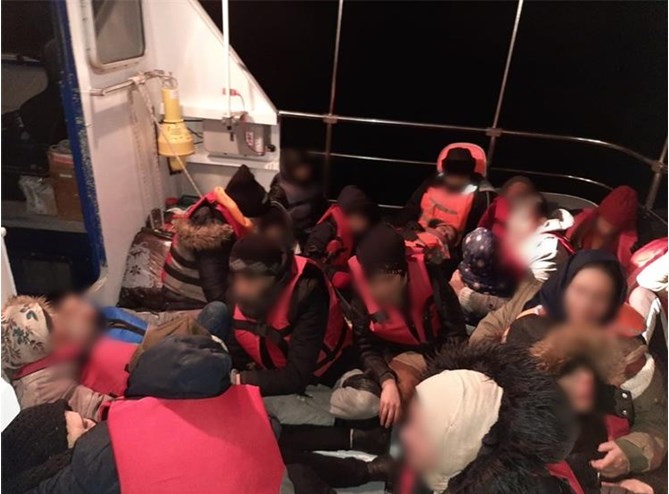
Croatia Police: Migrants on Dinghy Chilled, Dehydrated, Unconscious
"They found 36 foreign nationals on the dinghy, including five children, 11 women and 20 men. All were in poor health: chilled, dehydrated and some were unconscious. The inflatable had run out of fuel and the sea temperature where they were found was only 2 degrees Celsius. It is difficult to say what might have happened to them had they not been rescued,” the Dubrovnik-Neretva Police Department pointed out.
The migrants were transported to a police vessel where officers provided them with water, hot drinks and thermal foil to warm them, after which they were transported to the port of Alexandropolis. They were met there and put under the care of the Emergency Medical Service according to Index on February 14, 2020.
"Out of the 36 migrants, five were hospitalized, while the rest, after receiving medical assistance, were transported to a reception center following further treatment in accordance with national and European legislation," the Dubrovnik police added.
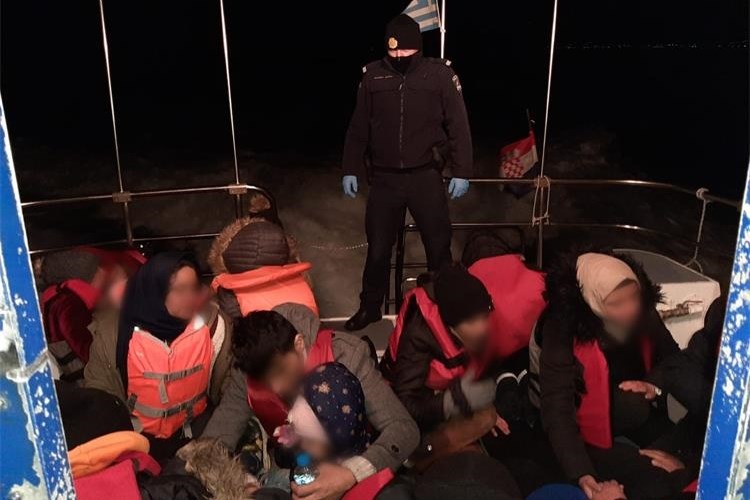
Greece Reports 60,000 Migrant Arrivals in 2019, 4,100 Arrivals in 2020
Following more than 60,000 arrivals last year, more than 4,100 refugees and migrants have reached Greek shores so far in 2020.
Recently, the Croatian parliamentary Committee on Home Affairs and National Security unanimously decided to conduct direct oversight of Croatian police work following complaints about the police treatment of migrants, Committee Chairman Ranko Ostojić (SDP) told the press after the committee meeting on February 6, 2020.
An archive of Total Croatia News coverage on the migrant crisis in Croatia can be accessed here.
Coronavirus Shuts Down Chinese Factory Supplying Croatia Peljesac Bridge
The Pelješki most (Pelješac Bridge) might be the first victim of the coronavirus in Croatia. The Chinese factory which is building the steel structures for the bridge is temporarily closing. Fortunately, the virus has not yet reached Croatia.
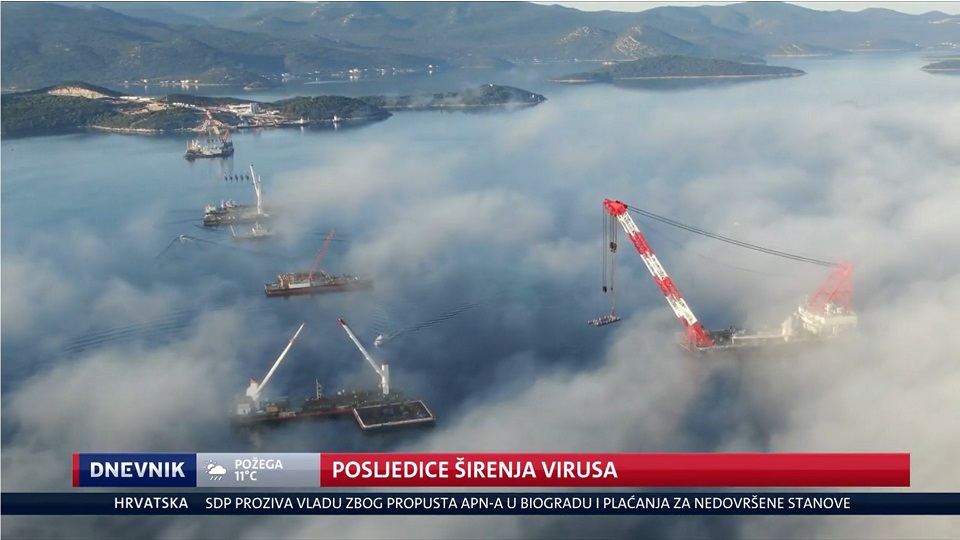
Coronavirus Closes Chinese Steel Structure Factory
The virus has paralyzed China, and that now includes the factory where steel structures are being made for the Pelješki most, according to Vibor Vlainić/Dnevnik on February 13, 2020. This does not mean that work on the bridge will cease in Croatia, but the question remains what will happen when the time comes to install these new structures.
Will the steel structures arrive in Croatia on time? Hrvatske autoceste (Croatian Roads) indicated that the contractor has not asked for an extension. The bridge is scheduled to open on July 31, 2021.
"The contractor (China Road and Bridge Corporation) has taken all the necessary measures, first and foremost, to prevent a potential (coronavirus) health threat to the construction site. They have implemented protective measures at the site and these measures are being enacted according to clear guidelines," HAC reported.
However, Hrvatske autoceste will not be able to send supervisory engineers to the factory in China due to the rapid spread of the infection in that country.
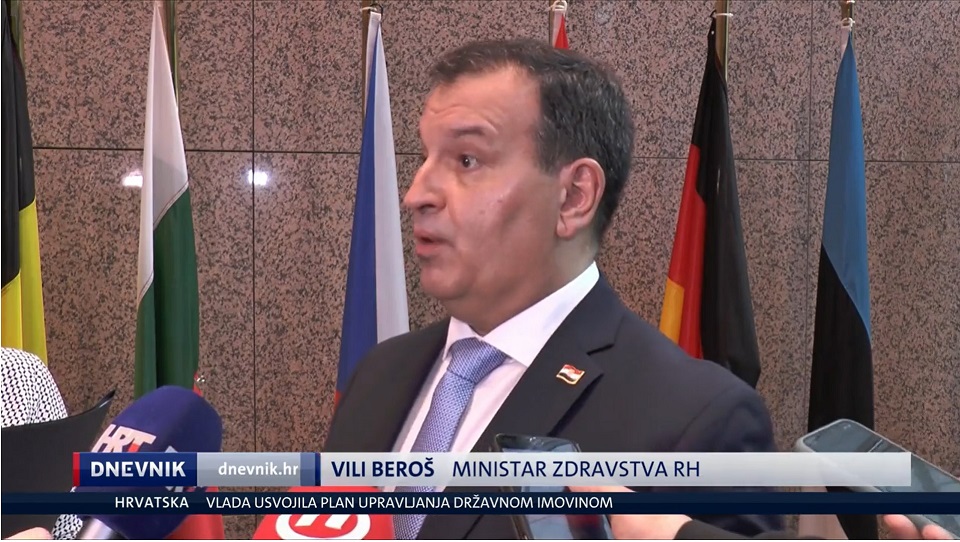
EU Heath Ministers Meeting: Croatia Will Not Close Borders
Due to the danger of the virus, a meeting of health ministers of all EU member states was held in Brussels at the invitation of the Croatian Presidency.
Although several countries have imposed entry restrictions on passengers who have been in China; Croatia has not yet followed suit. Two Chinese tourists have reported to Croatian hospitals with upper respiratory infections this past month: one in Pula and one in Split. Both tested negative for the coronavirus.
"We are not claiming to be absolutely certain (in our approach) but are taking caution. Everyone is asking about closing the Croatian borders, but that is not presently a realistic option. If the situation escalates; of course, we will consider additional factors. That is the most constructive approach for this situation, because emergency situations require extraordinary measures," explained Health Minister Vili Beroš.
At the meeting, several countries requested that each passenger coming from a country with confirmed coronavirus cases list each person with whom they have been in contact upon their entry to the European Union. But they eventually arrived at a compromise.
"It is certain that any person would be able to list all the contacts they have had, but it is expected that someone would answer whether they have had contact with people who have showed signs of illness, cough or fever or have been ill," Beroš added.
Daily updates on the coronavirus can be found here. An archive of Total Croatia News articles on the coronavirus can be accessed here.
Croatia Water Polo Learns Opponents for Final Olympic Qualifying Tournament
February 12, 2020 - Croatia water polo will have their last chance to qualify for the Tokyo Olympics next month.
Gol.hr reports that the Croatia water polo team will have one final chance to qualify for the Tokyo Olympics this summer in a qualifying tournament to be held in Rotterdam from March 22 to 29, 2020. Croatia will test their strength in a group against Germany, Russia and the Netherlands.
At the draw held at FINA's headquarters in Lausanne on Tuesday, Croatia was placed in Group B, with teams from the Netherlands, Russia, Germany, Argentina, and the second Asian representative, while Georgia, Canada, Brazil, Montenegro, Greece, and the first Asian representative are in Group A.
At the Olympic qualifying tournament, after the group stage, the top four teams from each group will advance to the quarterfinals (1A – 4B, 1B – 4A, 2A- 3B, 2B – 3A). The winners of the quarterfinal matches will play in the semifinals, and the three first-ranked teams will qualify for the Olympic tournament, which will be held in Tokyo from July 24 to August 9.
The tournament favorites are three European teams - Montenegro, Croatia, and Greece.
"It would certainly be better for us if we got Greece or Montenegro in the group, because now in the semifinal we will certainly have an extremely tough rival, as it will be one of those two teams. But we know our way. We have to be the best and finish this story," said Croatia national team coach Ivica Tucak who watched the draw from Varazdin, where Croatia played the 3rd round of the World League against the tournament hosts and rivals in the Olympic qualifying group, the Netherlands. Croatian topped the Netherlands 16-7 (5-3, 2-2, 4-1, 5-1) in Varazdin and advanced to the quarterfinals. With this expected win, Croatia finished second in the group behind Serbia and will play in the quarterfinal against the winners of Group D, Montenegro or Spain, who play later.
Maro Jokovic was the best for Croatia with six goals. Luka Bukic and Rino Buric scored two goals each, as did Milos Filipovic and Jesse Koopman for the Netherlands.
Croatian coach Ivica Tucak said that there was a considerable difference in quality. However, the fourth place from the European Championship in Budapest still weighed heavily on the player's minds.
"Everyone missed a lot of shots. Surely this is still mental from Budapest. It's a good thing this game has come. Let's deal with all the ugly that has left a psychological trace. Budapest remains in the minds of the players," Tucak said.
To read more about sport in Croatia, follow TCN’s dedicated page.
Croatia Introduces Bill to Legalize Recreational Marijuana: MP Mirela Holy
Will Croatia be the first country in Europe to fully legalize recreational marijuana? According to Croatian MP Mirela Holy (SDP), the upcoming proposed legislation would allow each adult to grow up to nine marijuana plants with high THC content for personal use. Nobody has ever died from a natural cannabis overdose, she emphasized.
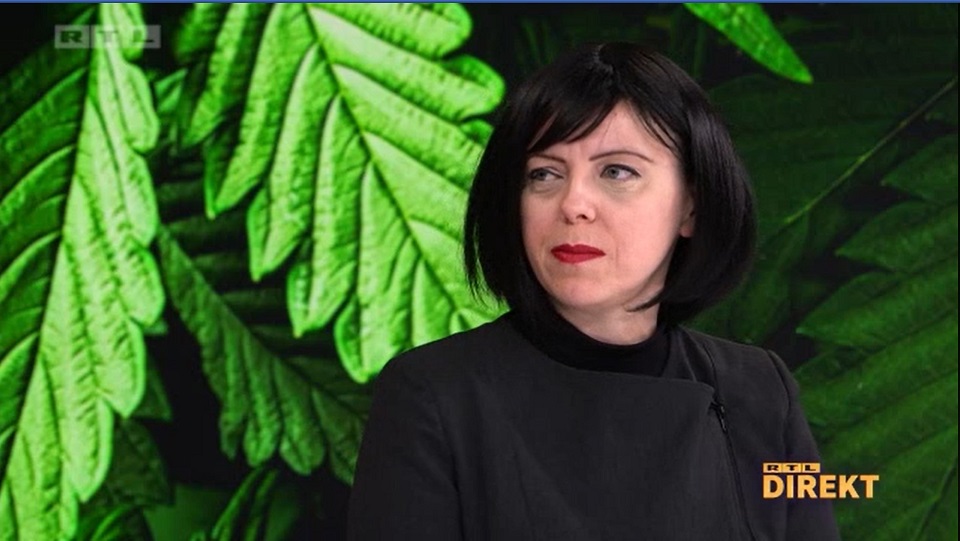
Mirela Holy | RTL Direkt
Croatia Marijuana Bill Goes to Public Debate Soon
In recent years, HDZ (Croatian Democratic Union) has begun to change its rigid views on marijuana. However, more and more people believe that decriminalization is not enough. One of them is Mirela Holy, SDP Green Development Council President, and one of the most prominent public figures supporting "Lex Cannabis". She revealed that the bill will be going to public debate within a week and that will be followed by a parliamentary debate. The bill would provide for the full legalization of cannabis.
“’We invite all those interested to participate in the public debate,’ reads the bill and comments. It envisages the full legalization and liberalization of hemp, which means that it fully envisages harnessing all the potential of cannabis for economic, recreational and medical purposes,'' explained Holy to Mojmira Pastorčić/RTL Direkt on February 10, 2020.
She points out that current models of recreational regulation have either gone under state control like in Uruguay or through the private sector like in Canada and the US.
Hybrid State Agency Model to Maintain Product Quality
''We propose a state agency hybrid (state/private) model to maintain the high quality (of the product) in the market. When it comes to the use of cannabis for recreational purposes, the bill would allow every adult to grow as many as nine female plants with high THC content for their personal needs.''
''Hemp farming has great economic potential. Given its high quality in terms of cleaning soil and up to four times higher CO2 absorption, growing hemp can also be an important tool in the fight against climate change. The economic benefits are enormous, for the development of science, cosmetics use and paper production,'' Holy added.
Experience in other countries shows that there is still a black market, but that is why, she notes, state regulation is necessary to minimize the role of the black market.

US and Canada: 40 Billion EUR Annual Marijuana Earnings
''Earnings estimates from the sale of cannabis-related products in Canada and the US reach $43.7 billion (40 billion EUR) annually. In addition, the potential of hemp has not been fully realized. It can be used to build cars and as building materials for the construction industry,'' Holy explains.
Marijuana is legal for recreational and medical use in Canada, Uruguay, Georgia and South Africa. Eleven US States and DC have also legalized marijuana: Alaska, Washington, Oregon, California, Nevada, Colorado, Illinois, Michigan, Vermont, Massachusetts, and Maine.
Recreational marijuana use is illegal but decriminalized in the following European countries: Portugal, Spain, Belgium, The Netherlands, Switzerland, Italy, Czechia, Austria, Slovenia, Croatia, Estonia and Moldova.
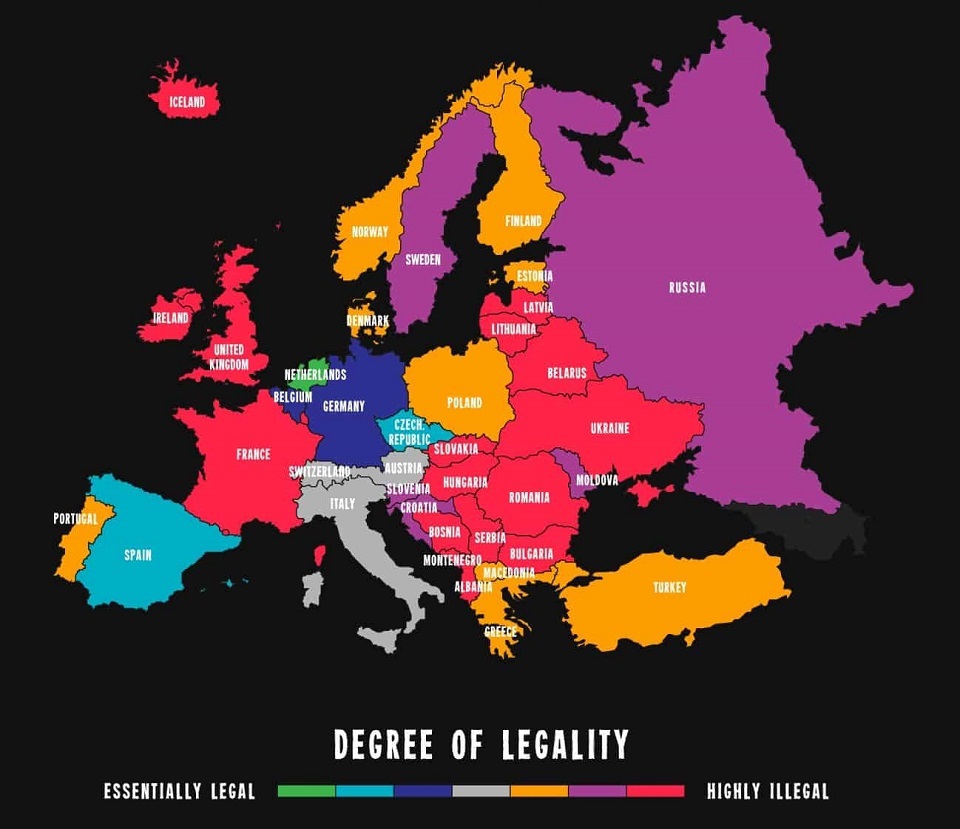
Marijuana is illegal for recreational use in all European countries but laws vary. | Herbonaut
Recreational Marijuana Decriminalized in Croatia: Legal for Medical Use
According to current Croatian law, growing or selling cannabis is considered a felony punishable by a mandatory prison sentence (three years minimum). The possession of a small amount of marijuana and other light drugs is considered a minor offence which can lead to a fine of 5000 to 20000 HRK (671 to 2682 EUR) depending on the case.
As of October 15, 2015; the Croatian Ministry of Health had officially legalized the use of cannabis-based drugs for medical purposes for patients with illnesses like cancer, multiple sclerosis, or AIDS.
However, many still wonder if Croatia is still a too conservative as a society for full recreational marijuana legalization, but Holy responds:
"When I started talking about this a few years ago, reactions were very negative, but things have changed. People need to be educated first and then they will change their attitudes. The addictive potential (of marijuana) is much less than the addictive potential of nicotine or alcohol. And, to my knowledge, nobody has ever died from an overdose of natural cannabis. Nevertheless, there are major prejudices which are fueled by the interests of certain groups and industries,'' Holy concluded.
Follow our Politics page for updates on the upcoming efforts to legalize marijuana for recreational use in Croatia.
Warrior Mode On: FIBA Features Bojan Bogdanovic in Latest Interview
February 11, 2020 - Croatian basketball player and Utah Jazz star Bojan Bogdanovic features on the official FIBA website this week.
In an interview with FIBA on Monday, February 10, Croatia captain and basketball star Bojan Bogdanovic said that he wanted to repeat the summer of 2016 when Croatia qualified for the Olympic Games.
Then it was played in Turin, and this time, the qualifying tournament is held in Split. Croatia is the host and only the winner of the tournament goes to Tokyo.
"We have to play every game as if it was a final, as if our lives depended on it." - ?️ @44Bojan#FIBAOQT | @CbfHks ??https://t.co/921Cxwyari
— FIBA (@FIBA) February 10, 2020
"We were in warrior mode in 2016. We want to achieve the same thing this summer, too. The mentality has to be - win, win, win and not to overthink. We all know that every team that is coming to the (FIBA Olympic Qualifying Tournament) is going to battle for a spot in the Olympics, because every player dreams about competing on the Olympic stage. I mean, basketball in the Olympics is one of the most followed competition, and every player has memories from the Dream Team, Team USA, their own national team or the Olympic Games in general,” Bogdanovic said, and added:
“When I heard we were going to play in Split, I was so happy! It's a huge basketball city and it's one of my favorite places in the whole country. Playing at home has to be a plus for us, we have to take advantage of this and show our country that we can win at home. The fans are already talking a lot about it, according to the feedback and information I got from my family and friends back in Croatia. We talk about it, too, between the players. Playing at home is a privilege, and we want to make the most out of it. It's going to be great, and don't want to and can't disappoint them. We count on them to be our sixth man.”
Croatia lost to Serbia in the quarterfinal at the Rio Olympics, where Bogdanovic scored 25.3 points per game.
“Oh man, I have so many good memories from the Rio Olympics! The atmosphere was unique, the people and the crowd were very good and noisy and the overall Olympic experience was very good,” Bogdanovic concluded.
Recall, the Olympic Qualifying Tournament will be held in Split from June 23 to 28, 2020. Croatia will face Tunisia and Brazil.
You can read the full interview on the official FIBA website.
To read more about sport in Croatia, follow TCN’s dedicated page.
Flights to Croatia: LOT Boosts Poland to Zadar, Iberia Increases Capacity to Dubrovnik
February 7, 2020 - The latest news from around Croatia’s airports for new flights to Croatia with updates from Dubrovnik, Zadar, and Zagreb.
Avio Radar reports that Spanish national airline Iberia, a member of the global airline association OneWorld, has announced larger aircraft on its route to Dubrovnik. On select flights on the Madrid-Dubrovnik route, from April 18-25 and September 7-26 this year, the larger, Airbus A330 will be used. The smaller, Airbus A321 aircraft usually runs on this route.
Furthermore, Avio Radar reports that Polish national carrier and Star Alliance member LOT Polish Airlines have announced a new route from Poland to Zadar. Namely, the new route will connect Rzeszow and Zadar once a week, from Saturday, May 30 to September 19, 2020. The Bombardier Q400 aircraft will run on this route. Rzeszow is located in southeastern Poland, and this will be the first scheduled line from Rzeszow to any Croatian destination.
Previously, the Polish regional carrier EuroLOT flew the Bombardier Q400 from smaller towns in Poland to Zadar, but these lines were discontinued when LOT took over EuroLOT.
LOT will also increase capacity on the Warsaw(Okecie-Fryderyk Chopin)-Zadar route. Specifically, in the heart of the season, the larger Boeing 737-800 aircraft was announced on this line instead of the smaller ERJ-195 Embraer.
Finally, Ex Yu Aviation reports that we have good news from Zagreb Airport, which welcomed 203,035 passengers in January, which is up 6.2%. Aircraft movements also grew from 2.9% to 3.133%.
Zagreb Airport General Manager, Huseying Bahadir Bedir, expects this trend to continue
“We expect this trend to continue in 2020. Since the opening of the new passenger terminal, we have achieved significant results in overall traffic, such as an increase in passenger numbers, the number of destinations, new carrier, cargo traffic, an increase in the number of employees, as well as new shops and sales outlets that have been opened. With our strategies and strong focus on future development, we expect even better results in the years to come”.
To read more about travel in Croatia, follow TCN’s dedicated page.
Croatia Constitutional Court: Same Sex Couples Can Be Foster Parents
The Croatia Constitutional Court has decided: same-sex couples in Croatia have the right to be foster parents on the same terms as everyone else.
Croatia Court Decision Gives Same Sex Couples Foster Parent Rights
Croatian courts and other competent authorities are required to allow same-sex couples to provide foster care on the same terms as other qualified applications. The Constitutional Court decided this by evaluating as many as eight proposals and requests to review the constitutionality of the Foster Care Act and its provisions for removing same-sex persons living in formal and informal life partnerships from the circle of potential foster parent applicants.
The Constitutional Court did not repeal the challenged legal provisions, arguing that this would create a legal loophole, but stated unequivocally that the exclusion of same-sex couples from foster care was discriminatory and unconstitutional, and provided clear instructions to the courts, social welfare centers and other decision-making bodies regarding these issues and indicated they must not exclude applicants based on their life partnership status.
High Court Found That Legal Provisions ‘Silenced’ Same Sex Partners
“The Constitutional Court found that the impugned legal provisions which left out (‘silenced’) a certain social group produces general discriminatory consequences against same-sex persons living in formal and informal life partnerships, which is constitutionally unacceptable,” points out in the summary of the Constitutional Court's decision.
It is further stated that discriminatory effects cannot be eliminated or replaced by the intervention of the Constitutional Court in the existing content of the law according to Ivanka Toma/Jutarnji List on February 7, 2020.
“Namely, the Foster Care Act has a legitimate purpose - the protection of the interests and well-being of socially disadvantaged persons - and in this respect is not in conflict with the constitution. The mere repeal of the impugned legal provisions would lead to a gap in the existing model of public foster care service and would have adverse consequences for the rights and interests of foster care users. Therefore, the Constitutional Court did not accept the proposals and the request for review of conformity with the constitution of the disputed articles of the Foster Care Act,” their decision reads.
Constitutional judges stressed that, despite not intervening in the legal text, "courts or other competent bodies that directly decide on individual rights and obligations of citizens in resolving individual cases are obliged to interpret and apply laws in accordance with their meaning and legitimate purpose, to make those decisions on the basis of the constitution, laws, international treaties and other sources of law."
“In the present case, this means that the impugned legal provisions are obliged to interpret and apply in a way that will enable all persons under equal conditions to participate in public foster care service, regardless of whether the potential foster parent lives in an informal or formal life partnership,” according to the Constitutional Court's unambiguous message.
Constitutional Court President Miroslav Šeparović says the Kožić-Šegota case, in which the Administrative Court gave them the right to be foster parents, and the Social Welfare Center’s refusal to enforce the court's decision had had no bearing on their decision.
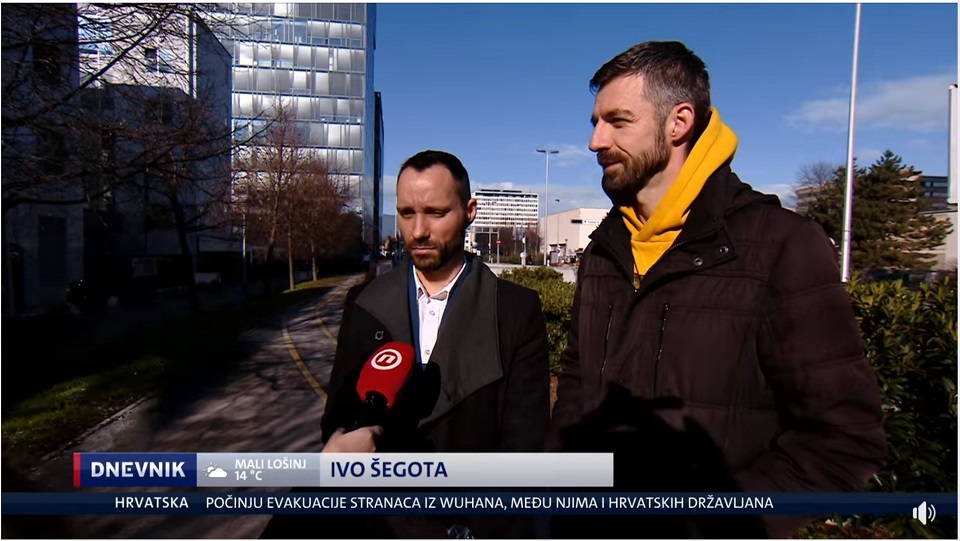
Gay Life Partners Ivo Šegota and Mladen Kožić in January after second foster care rejection. | Nova TV
Administrative Court Decision Did Not Influence Constitutional Court Decision
“The Constitutional Court has been reviewing this law for several months and the decision of the Administrative Court in no way influenced the decision of the Constitutional Court. But we have indicated that courts and administrative bodies are obliged to act in accordance with the Constitution and international regulations and must interpret laws so that no social group is discriminated against,” added Šeparović.
Regarding the Kožić-Šegota case, he pointed out that the Social Welfare Center should have acted on the decision of the Administrative Court which allowed the couple to be foster parents without this Constitutional Court decision. However, the Constitutional Court decision further obligates them to honor the lower court’s decision, and notes that this same-sex couple must not be discriminated against and that they can be foster parents on the same terms as anyone else who meets the legal requirements.
Ivo Šegota and Mladen Kožić, who are gay life partners, applied to the Social Welfare Center to become foster parents three years ago. After rejecting their application, the center explained that the couple cannot foster children because the law does not allow them to do so as life partners. Last December, the Administrative Court handed down a historic verdict which stated that life partners could be foster parents. However, their request was rejected again by the Social Welfare Center in January.
The President of the Constitutional Court recalls that, under the Constitutional Act of the Constitutional Court, Constitutional decisions must be enforced, and the government is obliged to ensure compliance.
“The point of this decision is that opportunity to provide foster care service must be given to everyone under the same conditions, regardless of whether the potential foster parents are of same-sex orientation. This does not mean that they are privileged, but their foster care must be allowed if they meet the legal requirements,” explained Šeparović.
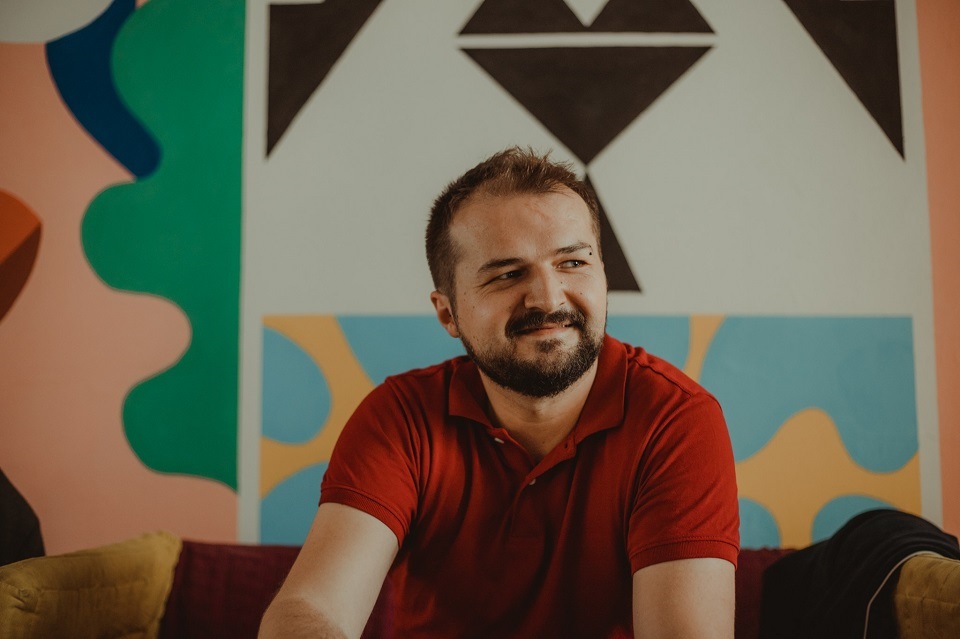
Daniel Martinović | Coordinator for Dugine obitelji (Rainbow Families)
Dugine Obitelji (Rainbow Families) Official Statement
Daniel Martinović, Coordinator at Dugine obitelji (Rainbow Families), released the following statement:
“Today's Constitutional Court decision states that the Foster Care Act must be interpreted to include life partners as equals as other foster parents, and that this is the only correct interpretation of the act.”
“The decision recognizes and prevents discrimination against life partners in the future and does what politicians in Croatia have not accomplished for years. This is a positive leap forward for the equality for all citizens of the Republic of Croatia, regardless of their sexual orientation or gender identity.”
“The LGBT community has once again fought for its rights alone, persistently and together. Our courage and insistence on a fairer society can hopefully be a milestone for other marginalized groups in our society.”
Croatia Constitutional Court Decision Ends Three Year Court Battle
Information on the December 2019 court decision can be found here. Details about the Social Welfare Center’s January 2020 rejection of the couple’s second foster care application can be found here.
A history of the couple's efforts to become foster parents and information on the LGBT rights movement in Croatia can be found here.
To learn more about the efforts of Rainbow Families (Dugine obitelji), check out their website and Facebook page.
The Croatia Constitutional Court decision (in Croatian):
Odluka Ustavnog suda o udom... by Index.hr on Scribd
Croatia EU Ambassador: 'Good Riddance' UK Becomes English School Billboard
“Good Riddance, UK!” After Irena Andrassy, Croatian ambassador to the EU, delivered her side-splitting parting statement to the UK; one English language school in Zagreb, Croatia used the ambassador’s English language fail to their advantage. She emitted the Freudian slip (?) while chairing the last meeting between the envoy of the United Kingdom and the European Union.
‘Good Riddance’ Becomes Croatia Ad Campaign
To widespread amusement, Andrassy told British Ambassador to the European Union Tim Barrow "Thank you, goodbye, and good riddance" which means "Thank you, goodbye, good to be rid of you", according to JutarnjiList on February 6, 2020.
The Američki institut (American Institute), a private English language school based in Zagreb, posted a photo of the new jumbo roadside billboard promoting the ambassador’s gaffe. The poster says: “Good riddance", and attributes those apparent no love lost parting words to the Croatian ambassador. The American Institute logo and message follow below along with the slogan: “Rid yourself of bad English”.
"Tree tousand young people" | Irena Andrassy
Croatia Ambassador Scrambles for Control of Runaway Gaffe
The Brexiting British and English speakers around the globe have enjoyed many laughs at Ambassador Andrassy's expense. After realizing the joke was on her, she rapidly responded in a Twitter post implying that her apparent gaffe was intentional, but that she was only kidding.
This isn’t the first time the American Institute has used the poor English skills of celebrities for its advertising campaigns. In 2017, the language school advertised English lessons with a photo of Melanie Trump on a roadside billboard: “Just imagine how far you can go with a little bit of English.”
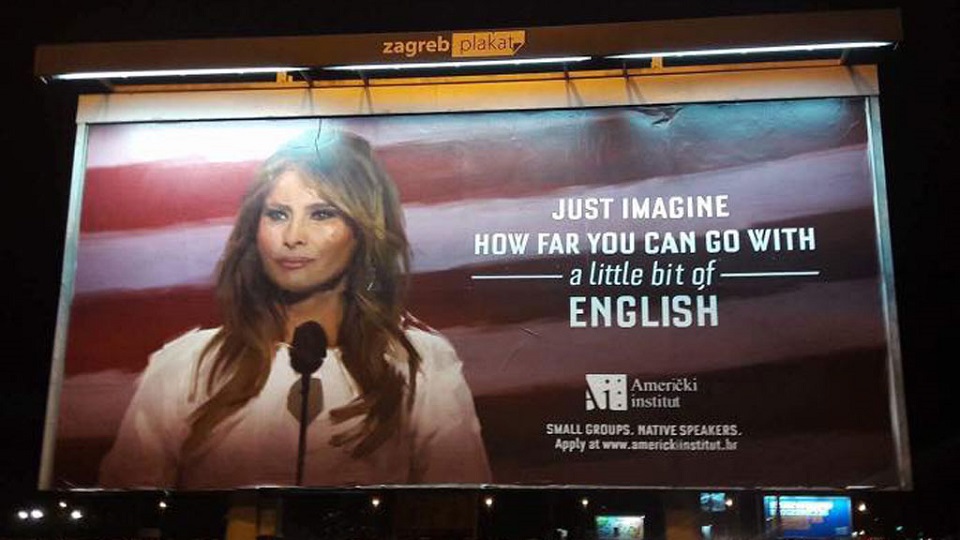
First Lady Dispatched Legal Team to Threaten Language School
The First Lady of the United States was displeased with this representation of her considerable accomplishments and command of the English language. Through her legal team, the she demanded that the school remove the billboards within 24 hours or face severe legal consequences. The American Institute bowed to the demands of Trump's powerful legal team. However, because they had already leased the advertising space, they replaced the poster with another clever billboard; this time without Melania’s image.
On their Facebook page, the American Institute posted a photo of a new billboard with the caption “Take 2": “Invest in your English and billboards. People love a good billboard,” the new billboard sign advised.
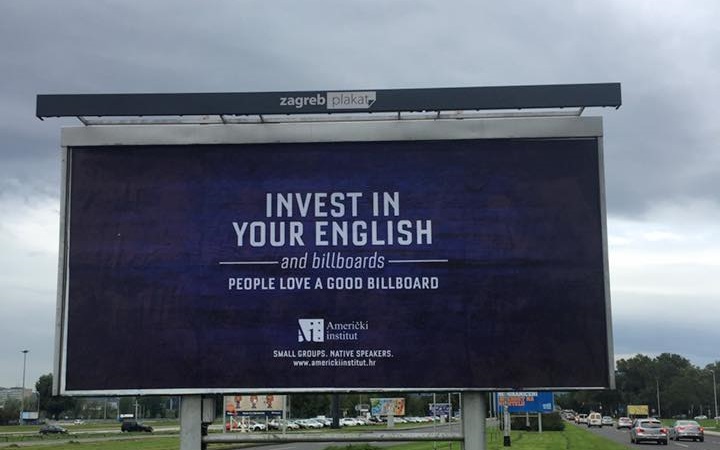
Click here for more Total Croatia News articles on the First Lady, her accomplishments and English-speaking skills. Follow this link for TCN articles on prominent Croatians speaking English. Check out the Američki institut’s Facebook page for more amusing promotional imagery and an illustrated array of vocabulary builders.

Split Hospital Quarantines Potential Coronavirus Patient: Not Infected
A man has been quarantined at the Split KBC hospital as a precautionary measure while he is tested for the coronavirus. "The patient is isolated at the Infectious Diseases Clinic; but the coronavirus diagnosis has not yet been confirmed," the hospital reported to Dalmatinski portal on February 2, 2020.
*UPDATE February 3, 2020 at 19:10 CET: Further coronavirus test results have confirmed the patient does not have the coronavirus.
Split Crisis Staff Doctors for the Prevention and Control of Infections held a press conference today February 3, 2020 at 13:00 CET regarding the case.The tests finding were sent to the Clinic for Infectology Fran Mihaljevic in Zagreb. They should know today whether his symptoms are due to a coronavirus infection or if they are caused by something else. More information here.
*DAILY UPDATES: Total Croatia News provides LIVE daily updates on the coronavirus epidemic here. An archive of articles can be found here.
Split Patent in Quarantine Awaiting Test Results
The diagnosis is not yet known, but given that he has recently been to China, he has been isolated as a preventive measure. All necessary examinations have been performed, and he will remain separate from the other patients until the results of the findings.
He is currently in the infectious ward in Split. In the event of a positive finding, he will be transferred to the Zagreb hospital Dr. Fran Mihaljević.
Osijek Patient Does Not Have Coronavirus
Subsequent coronavirus tests showed that the 26-year-old Đakovo resident hospitalized in Osijek KBC after returning from China did not contract the coronavirus, according to Index on February 2, 2020.
Alemka Markotić, Director of the Infectious Diseases Clinic Fran Mihaljević, confirmed for the HRT Dnevnik that the tests on a patient in isolation in Osijek for suspected coronavirus showed that the patient did not suffer from the virus.
Test Findings Sent to Center in Berlin
"Yesterday and today we worked on testing blood and the upper respiratory tract. In one test, some of these samples were slightly positive and the other, which we consider to be affirmative, was completely negative both yesterday and today. We are obliged to send a sample for further confirmation to reference centers. The patient is not coughing and is in good general condition. He will probably be under some medical supervision unless the development of the disease is seen," said Markotić.
She confirmed that their clinic had received a test from Berlin three days ago. She explained that coronavirus is quite similar in behavior and molecular characteristics to SARS, but it also differs in many ways and is apparently spreading much faster. She said that it was difficult to distinguish symptoms from the flu, but that coronavirus complicates pneumonia, while that is not the case with flu.
Expects That Coronavirus Will Last Until Spring
Asked if she knew how long the epidemic would last, she replied that she did not know the answer to that question, adding that the virus was spreading by droplet and that it was expected that with the onset of spring the virus should disappear.
A 26-year-old Đakovo resident was hospitalized in Osijek KBC on Saturday on the tenth day after his return from China and he reported a temperature of 38 degrees, after which he was isolated. The rules of the profession dictate that every patient who comes from China must be treated in this manner and have respiratory problems or fever for two to ten days.
*DAILY UPDATES: Total Croatia News provides LIVE daily updates on the coronavirus epidemic here. An archive of articles can be found here.


